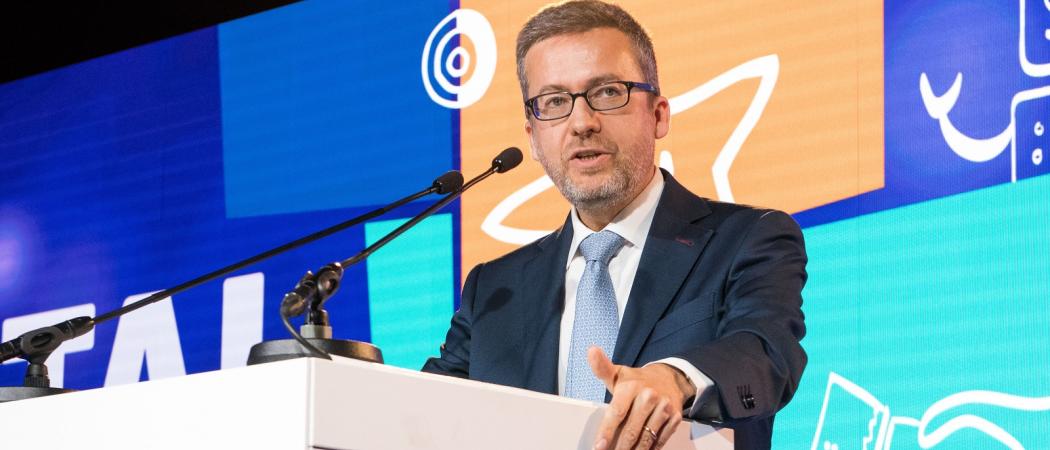Commissioner Moedas says German chancellor called him 'at some point' to underline her support for basic science funder

Photo: EC - Audiovisual Service
The European Research Council has lots of fans, and apparently German Chancellor Angela Merkel is among them.
At a conference in Brussels, Carlos Moedas, in his last weeks as EU Commissioner for research, science, and innovation, said that Merkel telephoned him once from her plane to voice support for the ERC.
Discussing the unusual communication for the first time, Moedas said, “At some point, I got a call from the German chancellor’s airplane. She said that fundamental science is crucial, and [that] ‘I care personally about the European Research Council’”.
Moedas did not elaborate at the conference, but sources said the brief call happened in early May this year, and Merkel underlined the importance of maintaining the ERC's autonomy. At the time, scientific leaders were alarmed that the Commission bureaucracy was trying to take more control over the agency, which has thrived under the semi-autonomous leadership of its governing Scientific Council. A few months earlier the agency's director had abruptly announced his early retirement in protest.
The anecdote is relevant because the budget battles in Brussels are soon to resume, with hundreds of different lobby groups pushing their priorities in the proposed €94.1 billion Horizon Europe programme, to start in 2021.The chancellor has a personal link to the ERC: her husband Joachim Sauer, a quantum chemist and professor emeritus of physical and theoretical chemistry at the Humboldt University of Berlin, has previously helped the funder review funding applications.
Merkel’s call was the most high profile intervention to protect the EU’s blue-skies budget and followed a similar appeal by dozens of Nobel prize-winners, who wrote to the President of the European Commission, Jean-Claude Juncker, in 2015 urging him to reverse his plan to slash EU spending on research and innovation by €2.7 billion. The raid was hugely controversial among scientists, with Juncker transferring the money into a new investment pot intended to boost EU infrastructure spending.
The Merkel call was one of a series of recollections from the outgoing Moedas, during a speech that took aim at the perception that Europe trails the US and China in science.
“We are good. We are much better than we sell ourselves. If we do a little bit of oversell, don’t worry. We’re still underselling ourselves,” said Moedas.
The commissioner, who will step down on October 31, enthused about his time in office, saying he helped engender a “higher, steadier ambition for research and innovation” in Brussels.
He said Europe was leading on climate change, and praised the pledge by the incoming administration to deliver a European Green Deal. The new Commission president Ursula von der Leyen has “set the bar so high” with this policy, he said.
“When you talk about China and the US, do you think the majority of their people think like us? A 16 year-old European girl is leading the way on climate change. She’s not American, she’s not Chinese, she’s European,” he said.
Moedas was referring to Swedish climate activist Greta Thunberg, who delivered an emotional and scathing speech at the United Nations on Monday, accusing world leaders of stealing her dreams with their inaction on climate change.
Moedas also praised his successor, Bulgaria’s Mariya Gabriel, saying she will be “an amazing commissioner”.
Gabriel, currently the EU’s digital economy chief, will be responsible for a portfolio covering education, research, innovation, culture, youth, and sport policies—areas that are now split between two commissioners. She will have two director-generals working under her.
“She is so lucky – she [got] the portfolio that any of us would think is the dream portfolio,” Moedas said.
Controversially, Gabriel’s new job title, commissioner for innovation and youth, doesn’t include the words “research” or “science.” Some researchers have interpreted this as a signal of reduced standing for science in the Commission.
The economist Mariana Mazzucato, who was speaking at the conference alongside Moedas, revealed a conversation with Gabriel about the title of her new portfolio.
Mazzucato, who advised Moedas on new research missions, said Gabriel believes that her role is to encourage more risk-taking among the young.
“The youth are not nurtured to welcome risk taking. It will be very interesting to see if there is some cultural shift in how we train our young,” Mazzucato said.
Members of the European Parliament will question Gabriel at a public hearing on September 30.
Moedas said he would leave a letter for the Bulgarian, outlying the pleasant aspects and pitfalls of the brief. He said he received a similar note from his predecessor, Máire Geoghegan-Quinn.
“She told me the good things, the bad things, and the things I should avoid in the job,” he said. “I will do the same.”
Editor's note: This article was amended 25 September to reflect further information about the timing and topic of the Chancellor's phone call.





 A unique international forum for public research organisations and companies to connect their external engagement with strategic interests around their R&D system.
A unique international forum for public research organisations and companies to connect their external engagement with strategic interests around their R&D system.